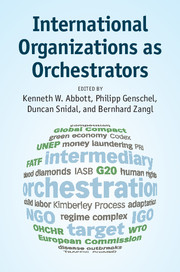Book contents
- Frontmatter
- Contents
- List of Figures
- List of Tables
- List of Contributors
- Acknowledgments
- List of Abbreviations
- Part I Introduction
- Part II Managing states
- 2 Orchestrating policy implementation
- 3 Orchestration on a tight leash
- 4 Orchestration by design
- 5 Efficient orchestration?
- 6 Orchestrating monitoring
- 7 Orchestrating enforcement
- Part III Bypassing states
- Part IV Implications
- References
- Index
6 - Orchestrating monitoring
the optimal adaptation of international organizations
Published online by Cambridge University Press: 05 April 2015
- Frontmatter
- Contents
- List of Figures
- List of Tables
- List of Contributors
- Acknowledgments
- List of Abbreviations
- Part I Introduction
- Part II Managing states
- 2 Orchestrating policy implementation
- 3 Orchestration on a tight leash
- 4 Orchestration by design
- 5 Efficient orchestration?
- 6 Orchestrating monitoring
- 7 Orchestrating enforcement
- Part III Bypassing states
- Part IV Implications
- References
- Index
Summary
Abstract
Orchestration is prevalent in global governance. This chapter asks why and under what conditions IGOs adopt orchestration for traditionally hierarchical tasks. I argue that IGOs rationally adapt to their strategic environment by working around binding constraints and tapping into alternative resources made available by non-state actors. Under certain circumstances, it may be both efficient and effective for IGOs to enlist non-state intermediaries to help monitor and enforce states’ compliance. In this sense, I argue, orchestration is an optimal strategy of adaptation. This model of orchestration highlights key hypotheses from the orchestration framework chapter (Abbott et al., in this volume), especially goal divergence and intermediary availability. I provide empirical support for these hypotheses through a comparative study of IGOs over a wide range of issue areas, including international security, international trade, the environment and human rights. In each case, the model helps explain not just the likelihood, but also the varying degrees and forms of IGO orchestration of non-state intermediaries in monitoring state compliance.
Introduction
International intergovernmental organizations (IGOs) often govern by making, monitoring and enforcing international law, approaching the theoretical ideal of hierarchy: “hard” and “direct” governance. Yet in reality, this traditional mode of governance is often not purely hierarchical, but punctuated with episodes of orchestration, in which IGOs enlist intermediaries to help with specific tasks in managing state targets.
- Type
- Chapter
- Information
- International Organizations as Orchestrators , pp. 139 - 165Publisher: Cambridge University PressPrint publication year: 2015
- 4
- Cited by



